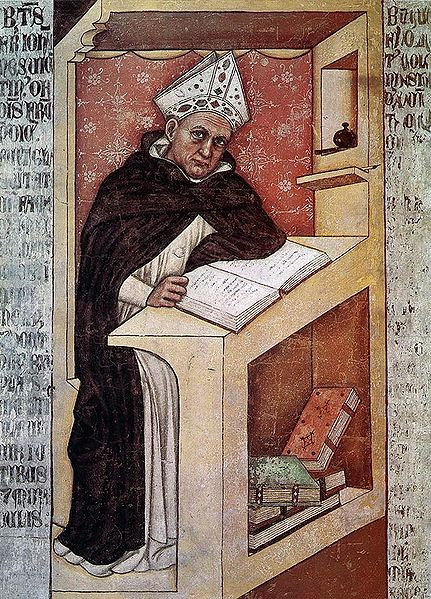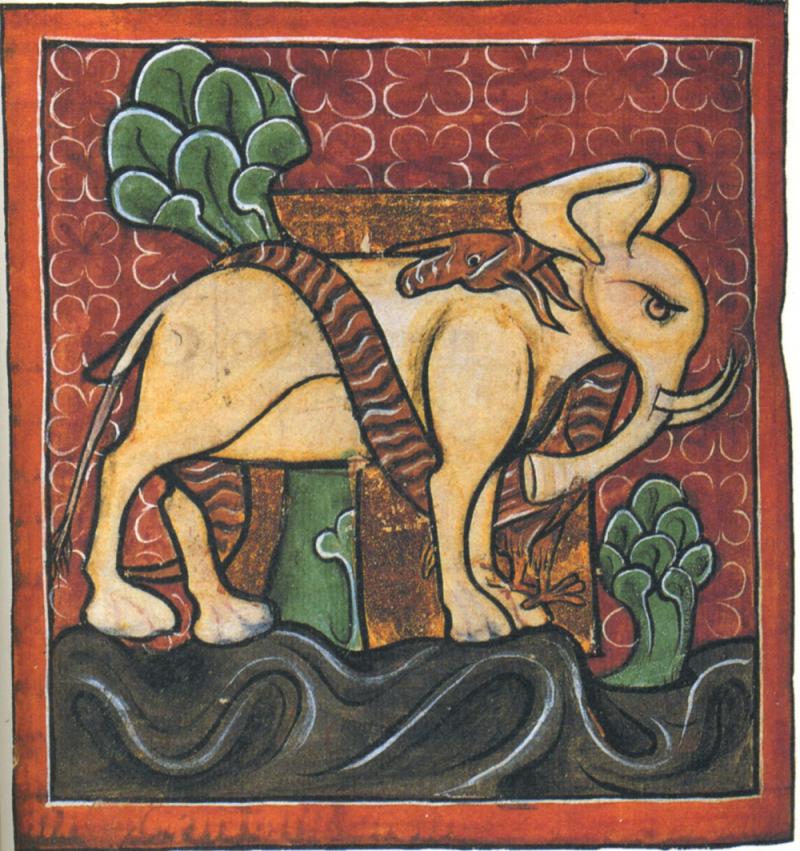When beggars die, there are no comets seen; the heavens themselves blaze forth the death of princes. —William Shakespeare, Julius Caesar, Act II.

So wrote Shakespeare in 1599, echoing a common assumption about the relationship between comets and terrestrial affairs. But more than three hundred years earlier one of the greatest medieval students of natural history—whose feast day was celebrated November 15—expressed a rather different opinion. Albertus Magnus, or St. Albert the Great (ca. 1200–1280) said about comets that we can discover no reason why they seem to be associated with royal deaths and looming conflict: a comet has a natural cause not dependent on anything else; so it seems that it has no relation to someone's death or to war. (De Cometis, "On Comets")
Like other medieval natural philosophers, Albert did not rule out the possibility of the influence of celestial bodies and events upon terrestrial affairs — in the thirteenth century there was as yet no cosmological reason not to assume a connection between heaven and earth. However, he conducted his astronomical and other scientific investigations carefully and critically using the principles of Aristotelian natural philosophy.
Albert was a valued administrator for the Dominican Order and the Catholic Church as a whole, and he rose to be appointed Bishop of Regensburg. However, at heart he was always a scholar, and although theology was his principal interest, he regarded natural philosophy as a complementary way of examining the created works of the “First Cause” or God. For all his familiarity with the established scientific paradigm, Albert was no slavish imitator of the father of Greek experimental philosophy. In a medieval atmosphere that all too readily made Aristotle a canon of truth, Albert quite candidly asserted his own independence:
Perhaps some will say that we have not understood Aristotle and that on this account we have not agreed with what he said or that (from their certain knowledge) we contradict him in point of truth on some matter. To him we say that whoever believes Aristotle was a god ought to believe that he never erred; if, however, one believes him to be but a man, then without doubt he could err just as we can too. (De Physica)
As a good Aristotelian, Albert insisted that “the aim of natural science is not simply to accept the statements of others—[even that of Aristotle]—but rather to investigate the causes that are at work in nature.” (De Mineralibus, "On Minerals"). In his view “nature is the foundation and model of science:
Art [technology] work according to nature in everything it can. “Therefore, it is necessary that the Artist follows Nature and operates according to her.” (The Compound of Compounds).

The Order sent Albert to Cologne in 1248 (accompanied by the young Thomas Aquinas) to establish a studium generale (general order of study) for Dominican students in Germany. Quite boldly, Albert lectured on Aristotle’s Physics in the stadium, convinced that a solid grounding in both philosophy and science were indispensable to theological studies. This was the beginning of his ambitious project of laying out in a systematic way the whole of human learning, including not only the contents of the undergraduate trivium or “three ways” (grammar, logic and rhetoric) and quadrivium or “four ways” (arithmetic geometry, astronomy and music). On this foundation was laid the natural sciences, economics, ethics, politics, and metaphysics.
Albert made a careful distinction between natural and supernatural explanations. Something might be interpreted as miraculous in theological terms, but it can never be so in scientific perspective:
In studying nature we have not to inquire how God the Creator may, as He freely wills, use His creatures to work miracles and thereby show forth His power; we have rather to inquire what Nature with its immanent causes can naturally bring to pass. (De Vegetabilibus, "On Vegetation")
Albert pursued a thoroughly naturalistic discussion of many different theories of earthquakes in De Meteoris, ultimately approving of the Aristotelian explanation in terms of subterranean winds, but appealing nowhere in this work to a theological or moral explanation. Similarly, his geology ruled out the supernatural:
To say that there is a soul in stones simply in order to account for their production is unsatisfactory: for their production is not like the reproduction of living plants, and of animals which have senses. For all these we see reproducing their own species from their own seeds; and a stone does not do this at all. We never see stones reproduced from stones ... because a stone seems to have no reproductive power at all. (De Mineralibus, “On Minerals”)
We remember St. Albert the Great for his profound influence on “natural philosophy” and “natural history.” Four centuries later the Scientific Revolution would accelerate the development of these numerous disciplines into what today we know as the sciences. Religious believers would do well to take a long look at Albert's careful distinction between scientific and religious explanations of natural phenomena.
